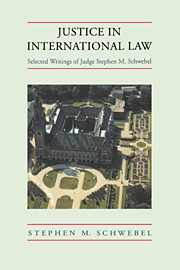Book contents
- Frontmatter
- Contents
- Preface
- PART I International Court of Justice
- 1 Reflections on the Role of the International Court of Justice
- 2 Relations Between the International Court of Justice and the United Nations
- 3 Was the Capacity to Request an Advisory Opinion Wider in the Permanent Court of International Justice than it is in the International Court of Justice?
- 4 Authorizing the Secretary-General of the United Nations to Request Advisory Opinions of the International Court of Justice
- 5 Preliminary Rulings by the International Court of Justice at the Instance of National Courts
- 6 Chambers of the International Court of Justice Formed for Particular Cases
- 7 Three Cases of Fact-Finding by the International Court of Justice
- 8 Indirect Aggression in the International Court
- 9 Human Rights in the World Court
- PART II International Arbitration
- PART III United Nations
- PART IV International Contracts and Expropriation
- PART V Aggression under, Compliance with, and Development of International Law
- List of publications
- Index
3 - Was the Capacity to Request an Advisory Opinion Wider in the Permanent Court of International Justice than it is in the International Court of Justice?
Published online by Cambridge University Press: 06 November 2009
- Frontmatter
- Contents
- Preface
- PART I International Court of Justice
- 1 Reflections on the Role of the International Court of Justice
- 2 Relations Between the International Court of Justice and the United Nations
- 3 Was the Capacity to Request an Advisory Opinion Wider in the Permanent Court of International Justice than it is in the International Court of Justice?
- 4 Authorizing the Secretary-General of the United Nations to Request Advisory Opinions of the International Court of Justice
- 5 Preliminary Rulings by the International Court of Justice at the Instance of National Courts
- 6 Chambers of the International Court of Justice Formed for Particular Cases
- 7 Three Cases of Fact-Finding by the International Court of Justice
- 8 Indirect Aggression in the International Court
- 9 Human Rights in the World Court
- PART II International Arbitration
- PART III United Nations
- PART IV International Contracts and Expropriation
- PART V Aggression under, Compliance with, and Development of International Law
- List of publications
- Index
Summary
In the nineteen years of active life of the Permanent Court of International Justice (PCIJ), 1922–1940, the Court gave twenty-seven advisory opinions. By way of contrast, the International Court of Justice (ICJ), in the forty-four years 1946–1990, has given twenty advisory opinions. This is despite the fact that, prima facie, the capacity to request advisory opinions of the Court is wider under the United Nations Charter and the ICJ Statute than it was under the Covenant of the League of Nations and the PCIJ Statute. In point of fact, however, that appearance is misleading, because, in practice, the capacity to request an advisory opinion of the Permanent Court was more generously applied in important respects than is the capacity to request an advisory opinion of the International Court of Justice. It is the purpose of this paper to recall that this was so and to consider what light the PCIJ experience may shed upon the current potential of the International Court of Justice. It is appreciated, of course, that such light will not be defining, because the frequency of requests for the Court's advisory opinions depends on a number of factors, of which capacity to make a request is just one, and not the most important.
The Provisions of the Covenant, the Statute, and the Rules of Court
Article 14 of the Covenant of the League of Nations provided:
The Council shall formulate and submit to the Members of the League for adoption plans for the establishment of a Permanent Court of International Justice. The Court shall be competent to hear and determine any dispute of an international character which the Parties thereto submit to it.
- Type
- Chapter
- Information
- Justice in International LawSelected Writings, pp. 27 - 71Publisher: Cambridge University PressPrint publication year: 1994



